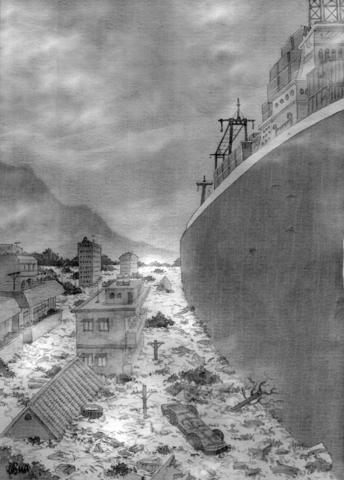Thailand's monsoon rains can sweep across Bangkok with a moment's notice, blacking out the sky and sparking floods that fill the street and then disappear just as quickly as they arrived.
Some 4,000mm of rain pours down on Thailand in a year, most of it between June and December, but shoddy management of the nation's water supply is causing shortages as agriculture, households and industry increase their demands, experts warn.
Demand for water could nearly double within 20 years, from 190 million cubic meters a year to 340 million cubic meters, one study at respected Mahidol University indicates.

ILLUSTRATION: YU SHA
Because rain doesn't fall evenly throughout the year, Thailand is also highly prone to drought. The just-ended dry season brought a drought that scorched 60 of the kingdom's 76 provinces.
To ease the problem, Prime Minister Thaksin Shinawatra said the military would drill 4,000 new drinking wells, and the government may ask its neighbors about diverting water from the Mekong river to help Thai farmers, a move which would require an agreement with China, Myanmar, Laos, Cambodia and Vietnam, which have also faced problems with drought
But such responses fail to address more pressing needs to change attitudes about water conservation, said environmental expert Kampanad Bhaktikul from Mahidol University.
What he describes as "a severe water shortage" has crept into Thailand over the last decade, with the public largely unaware, he said.
Drilling more wells is "the same as constructing a dam in the time of flood," he said, urging better water conservation.
"What we should do is long-term policy planning, a master plan of water resources development and management," Kampanad said.
People should be allowed more control over water resources in their home area, he said.
But letting local residents take charge of water in their neighborhood is not so simple, said Witoon Permpongsacharoen, who heads the lobby group Foundation for Ecological Recovery.
More than 100 rivers and basins criss-cross the country, but for the past century the Chao Praya river basin around Bangkok has dominated irrigation policy, Witoon said.
"This ignores each individual area's characteristics. The solution of water management should be based on local conditions," he said.
The royal irrigation department has drafted a new four-year national water management plan aimed at a fairer distribution to farmers, households and industry, the agency's chief Samart Chokkanapitark said.
The 200 billion baht (US$4.9 billion) plan, which needs Cabinet approval, covers 25 river basins and could be implemented starting next year.
The water supply problem is "serious," Samart said, because Thailand has enough water but not enough reservoirs and dams to collect it.
The department supplies an average 49,500 million cubic meters of water annually, but some 67,230 million cubic meters is demanded, Samart said.
To reduce the difference, the new plan calls for building dams and replacing leaky pipes, and urging farmers in some areas to replace rice crops with more water-efficient ones including corn or soya beans.
The scheme would also give locals a greater role in managing their water, and would increase Thais' water bills by adding on the cost of treating water. Bangkok residents currently only pay for the cost of using raw water.
Nationally, Thais use an average 200 liters of water per person a day, and 416 liters per person in the Bangkok metropolitan area, Kampanad said.
The figure for the city of more than 7 million people and its surrounding districts includes water used domestically and by industry, Kampanad said.
The international women’s soccer match between Taiwan and New Zealand at the Kaohsiung Nanzih Football Stadium, scheduled for Tuesday last week, was canceled at the last minute amid safety concerns over poor field conditions raised by the visiting team. The Football Ferns, as New Zealand’s women’s soccer team are known, had arrived in Taiwan one week earlier to prepare and soon raised their concerns. Efforts were made to improve the field, but the replacement patches of grass could not grow fast enough. The Football Ferns canceled the closed-door training match and then days later, the main event against Team Taiwan. The safety

There are moments in history when America has turned its back on its principles and withdrawn from past commitments in service of higher goals. For example, US-Soviet Cold War competition compelled America to make a range of deals with unsavory and undemocratic figures across Latin America and Africa in service of geostrategic aims. The United States overlooked mass atrocities against the Bengali population in modern-day Bangladesh in the early 1970s in service of its tilt toward Pakistan, a relationship the Nixon administration deemed critical to its larger aims in developing relations with China. Then, of course, America switched diplomatic recognition
The National Immigration Agency on Tuesday said it had notified some naturalized citizens from China that they still had to renounce their People’s Republic of China (PRC) citizenship. They must provide proof that they have canceled their household registration in China within three months of the receipt of the notice. If they do not, the agency said it would cancel their household registration in Taiwan. Chinese are required to give up their PRC citizenship and household registration to become Republic of China (ROC) nationals, Mainland Affairs Council Minister Chiu Chui-cheng (邱垂正) said. He was referring to Article 9-1 of the Act
Strategic thinker Carl von Clausewitz has said that “war is politics by other means,” while investment guru Warren Buffett has said that “tariffs are an act of war.” Both aphorisms apply to China, which has long been engaged in a multifront political, economic and informational war against the US and the rest of the West. Kinetically also, China has launched the early stages of actual global conflict with its threats and aggressive moves against Taiwan, the Philippines and Japan, and its support for North Korea’s reckless actions against South Korea that could reignite the Korean War. Former US presidents Barack Obama